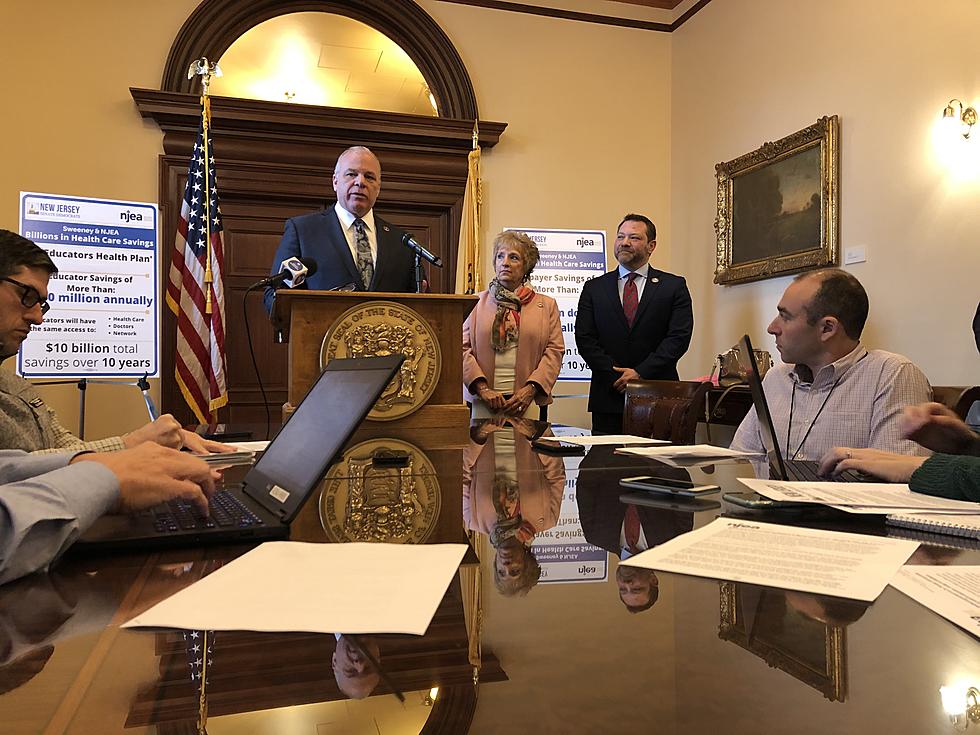
New health plan for teachers proposed, with promise of savings
A new health plan would be created for teachers, whose contributions toward their coverage would become based on a percentage of their salary rather than their premiums, under a deal announced Monday that might be fast-tracked for legislative approval this month.
Senate President Steve Sweeney, D-Gloucester, said the plan is expected to provide more than $1 billion a year in savings – $670 million for local school districts, as teachers shift into a plan with more cost controls, and $403 million for school employees, whose payroll deductions could shrink by thousands.
The agreement between Sweeney sand the New Jersey Education Association marks a significant shift in their relationship, which soured when Sweeney began advocating for pension and benefit reforms that peaked with the 2011 law signed by then-Gov. Chris Christie known as Chapter 78.
“I believe Chapter 78 reforms have been a success and now deserve review and modification,” said Sweeney.
“It’s no secret that our members have suffered a great deal under Chapter 78, which imposed what we have called unsustainable and ever-growing health-care costs,” said NJEA President Marie Blistan. “With this what we call creative and collaborative approach, that burden is going to be greatly reduced, and our members will no longer need to fear that their take-home pay will decrease year after year as a result of those imposed contributions.”
The savings derive mostly from the creation of the New Jersey Educators Health Plan, which would replace most other plans currently offered to teachers and be available starting in July. A second new option, the Garden State Health Plan, would be created by 2021 at a lower cost because its network would be limited to New Jersey-based health-care providers, with limited exceptions.
All new teachers would be enrolled in the New Jersey Educators Health Plan, while other teachers could choose to enroll in it.
Any teachers who remain in a currently offered plan would continue to pay toward it based on a percentage of the premium.
Details weren’t provided about the percentage of salary that would be deducted for the new plans or about copayments and other cost-sharing details. Sweeney said the copays would be reasonable and that coverage for in-network providers would be 100% covered.
“But I can tell you a teacher who chooses a different plan, the savings will be in the thousands,” Sweeney said.
Blistan said that with the pending change, NJEA members “will have the opportunity to move out from under” the 2011 changes to how health benefits are funded.
“This agreement on a fundamental problem that has now existed for nearly nine years was necessary to help break the cycle of the rising costs that were driving educators out of the profession, discouraging others from entering and leaving too many of those who remain struggling to make ends meet,” said Blistan.
Asked by reporters about their sudden détente, Sweeney said they had been speaking privately for months and that a deal was reached Sunday night.
“I would say that as you can see right now, we are standing side by side, and we’re both smiling,” said Blistan.
“This is a pretty huge announcement today, that we’re coming up with over a billion dollars in savings,” Sweeney said. “Who’d have ever thunk it?”
Sweeney said two actuaries reviewed the proposal and agree with the savings, though a bill doesn’t exist yet and didn’t make the actuary reviews available. He said a bill is being drawn up now, with the intention of having it passed before the Legislature begins its break for the budget review March 26.
Sweeney also agreed to support two bills that have been priorities for the NJEA that would benefit educational support professionals. One, S1928, is about subcontracting. The other S993, is about due process rules.
More From WOBM News:

More From Beach Radio










